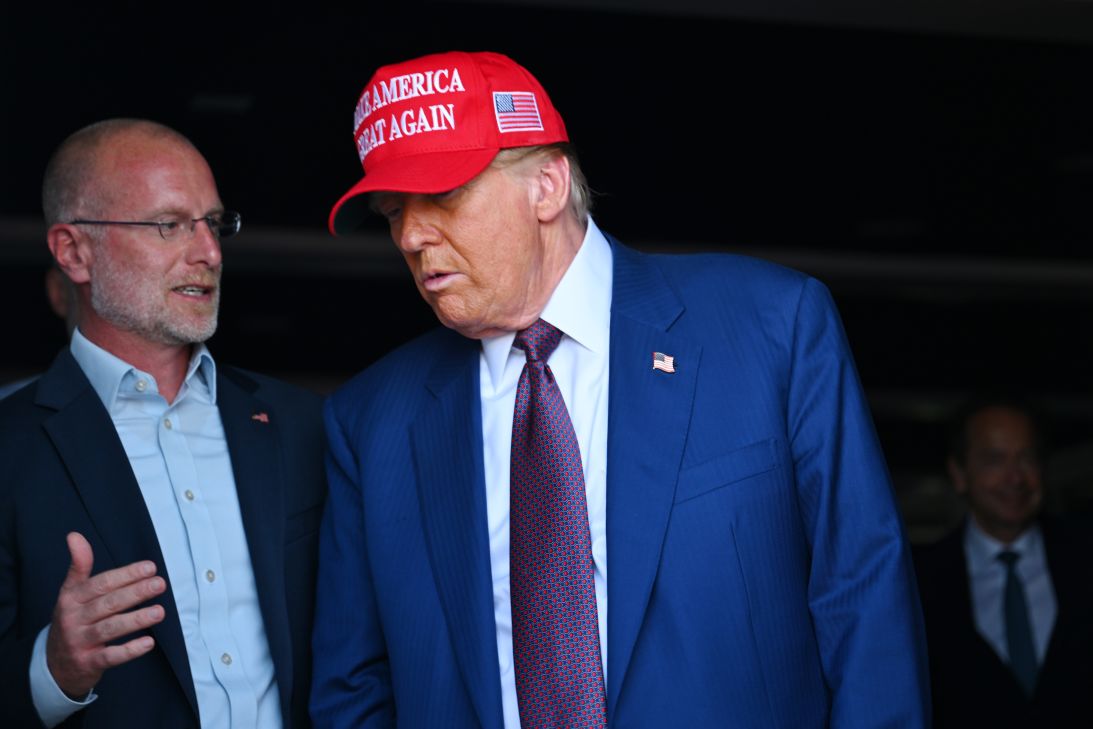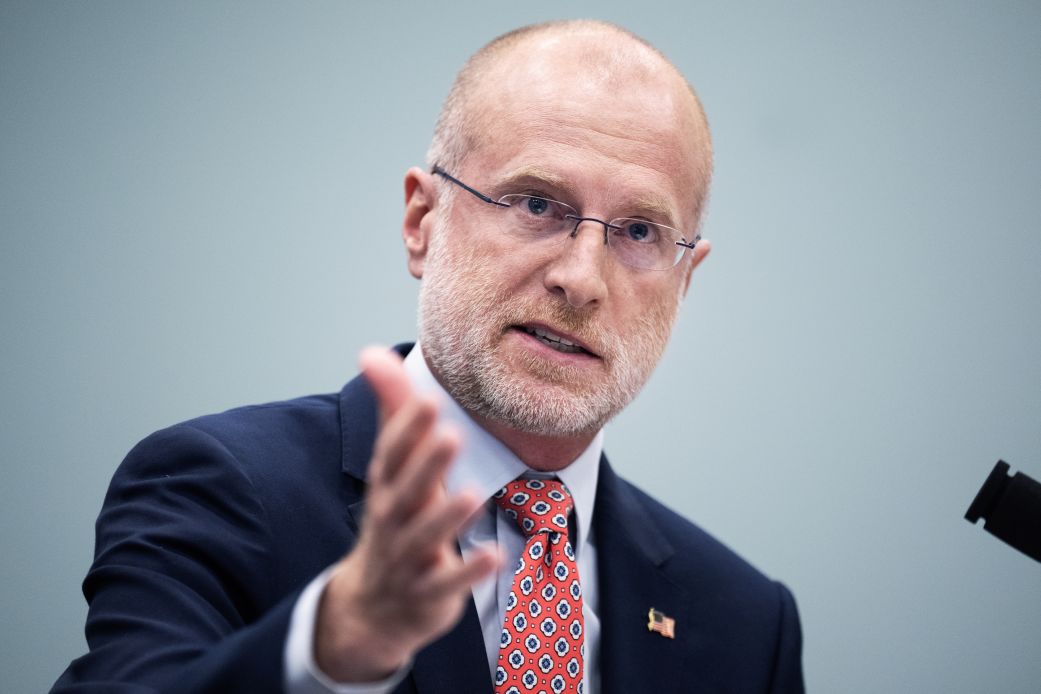Federal Communications Commission Chair Brendan Carr built his brand in part by warning against government meddling in “free speech” — now it appears he’s using his office to do just that.
For years, Carr cast himself as a First Amendment purist, denouncing efforts by Democrats and Republicans to lean on TV providers and social media platforms as “censorship” and a “chilling transgression of free speech.”
He’s defended political satire as “one of the oldest and most important forms of free speech” and warned that even subtle or informal pressure campaigns — letters, hearings, or backchannel threats — amounted to government trying to silence views it didn’t like.
But there was nothing subtle about the message Carr delivered on Wednesday about the on-air remarks Jimmy Kimmel made about murdered conservative activist Charlie Kirk. Speaking on a conservative podcast, Carr said that Disney and ABC executives could deal with Kimmel “The easy or the hard way,” suggesting that if the network didn’t take action, the FCC could make things more difficult for the company in future regulatory matters.
“These companies can find ways to change conduct and take actions on Kimmel, or there’s going to be additional work for the FCC ahead,” he said.
Hours later, Kimmel’s ABC show “Jimmy Kimmel Live” was suspended indefinitely from the air.
Carr’s remark stands in contrast to much of his record, especially his yearslong defense of political speech – including political satire – from government pressure. It also appears to go against a unanimous ruling by the Supreme Court last year affirming First Amendment rights. The court ruled in favor of the National Rifle Association in its lawsuit against a New York official urging companies to cut ties with the group.
“Government officials cannot attempt to coerce private parties in order to punish or suppress views that the government disfavors,” Justice Sonia Sotomayor wrote for the court. “Ultimately, the critical takeaway is that the First Amendment prohibits government officials from wielding their power selectively to punish or suppress speech.”
Appointed to the FCC by Trump in 2017, Carr now sits as its Republican chairman. For much of Trump’s first term, Carr spoke out in defense of free speech and against efforts to regulate social media and misinformation.
On social media, Carr repeatedly referred to freedom of speech as the “bedrock of democracy” and cast political censorship as a “tool that those in power use to suppress any challenge to their positions or orthodoxy.”
A CNN review of Carr’s X account revealed dozens of examples defending “free speech” from 2019 through 2025.

Carr is now exerting the same kind of pressure on Disney and ABC executives that resulted in the suspension of Kimmel’s show – echoing the very kind of government pressure he has long denounced.
The FCC and Carr did not respond to CNN’s requests for comment.
Carr has framed the decision to suspend the late-night talk show as a market decision from a network that reflects viewer demand. But that market decision came after Carr’s own public pressure against ABC.
In February 2021, Carr blasted two senior House Democrats, Reps. Anna Eshoo and Jerry McNerney, after they sent letters to a dozen major cable, satellite, and streaming providers — including AT&T, Verizon, Comcast, Dish, Roku, and Hulu — questioning why they continued to carry Fox News, Newsmax, and OANN.
The lawmakers argued that those networks had played a central role in spreading misinformation about the 2020 election and the COVID-19 pandemic. They asked the companies what “moral or ethical principles” guided their carriage decisions and whether they intended to continue distributing those channels
“Are you planning to continue carrying Fox News, Newsmax, and OANN on U-verse, DirecTV, and AT&T TV both now and beyond any contract renewal date? If so, why?” the letter concluded.
Carr lambasted the Democrats in public statements and media appearances.
“Democrats are sending a message that is as clear as it is troubling — these regulated entities will pay a price if the targeted newsrooms do not conform to Democrats’ preferred political narratives,” he said in a public statement at the time. “This is a chilling transgression of the free speech rights that every media outlet in this country enjoys.”
Speaking at a conservative think tank in March 2021, Carr warned that even informal political pressure could amount to censorship.
“You know, Congress can’t pass a law that would, you know, force a streaming provider you know to discriminate against one of these news outlets,” he said. “But they can write a pointed letter and they can sort of help support ad boycotts. And so we have this effort that I would say is sort of outside of the constraints of the First Amendment - that’s a thumb on the scale in favor of censorship in this entire trend in this country, towards less speech, more censorship.”
In early 2020, when some Democrats pleaded with Twitter to remove a manipulated video of then-House Speaker Nancy Pelosi from its platform, Carr described the action as “nothing more than a brazen attempt by government officials to silence political speech they don’t like. Bending to their pressure campaign would erode the free speech principles enshrined in the First Amendment,” he wrote in February 2020.
Around that same time, Carr defended political satire as “one of the oldest and most important forms of free speech” in response to calls to remove deep fake images of 2020 presidential candidates.

“Shutting down this type of political speech - especially at the urging of those targeted or threatened by its message - would represent a serious threat to our freedoms and ability to hold those in power accountable,” Carr wrote.
In a December 2022 post, Carr wrote that free speech was essential to challenge the “orthodoxy of the moment.”
“Free speech gives the powerless a voice. It ensures that anyone can challenge the political, religious, or scientific orthodoxy of the moment. That is why those in powerful positions–those that benefit from the status quo–are always trying to silence it,” he wrote.
Many of Carr’s tweets admonishing government censorship were directed at social media companies.
In an August 2024 tweet, Carr argued that if a social media company gets pressured by a government official to censor protected speech, the company should publicly and quickly disclose the request. He continued, “But there should also be accountability for government officials that jawboned social media companies like Facebook into censoring Americans’ protected speech,” he wrote.
In other tweets from 2024, Carr said he supported a “diversity of views” and that then President-elect Trump was committed to lifting the “wet blanket of government control” when it came to censorship.
“Censorship isn’t just about silencing words—it is about controlling ideas and replacing robust debate with the cement of orthodoxy. That’s why it is so unAmerican,” he wrote late last year. “America is (sic) country of founders, of trailblazers that push boundaries, of innovators. And that is why America’s scrappy entrepreneurs feel so much hope with President Trump.”




